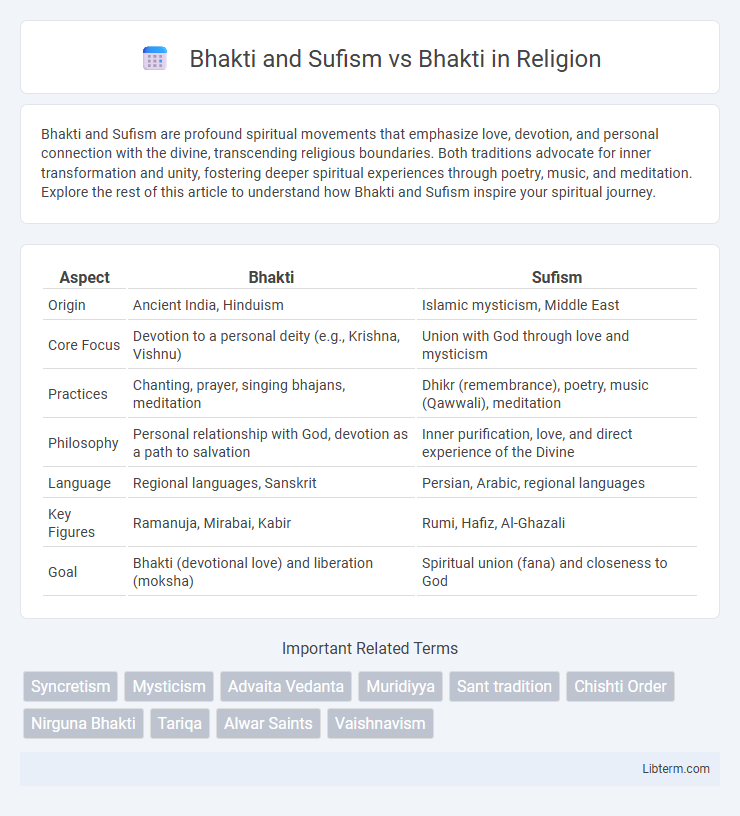Bhakti and Sufism are profound spiritual movements that emphasize love, devotion, and personal connection with the divine, transcending religious boundaries. Both traditions advocate for inner transformation and unity, fostering deeper spiritual experiences through poetry, music, and meditation. Explore the rest of this article to understand how Bhakti and Sufism inspire your spiritual journey.
Table of Comparison
| Aspect | Bhakti | Sufism |
|---|---|---|
| Origin | Ancient India, Hinduism | Islamic mysticism, Middle East |
| Core Focus | Devotion to a personal deity (e.g., Krishna, Vishnu) | Union with God through love and mysticism |
| Practices | Chanting, prayer, singing bhajans, meditation | Dhikr (remembrance), poetry, music (Qawwali), meditation |
| Philosophy | Personal relationship with God, devotion as a path to salvation | Inner purification, love, and direct experience of the Divine |
| Language | Regional languages, Sanskrit | Persian, Arabic, regional languages |
| Key Figures | Ramanuja, Mirabai, Kabir | Rumi, Hafiz, Al-Ghazali |
| Goal | Bhakti (devotional love) and liberation (moksha) | Spiritual union (fana) and closeness to God |
Understanding Bhakti: Origins and Core Concepts
Bhakti, originating in ancient India, centers on devotional worship and a personal connection with a chosen deity, emphasizing love and surrender as paths to spiritual liberation. Sufism, while sharing the devotional essence, integrates Islamic mysticism, focusing on inner purification and union with the Divine through love and selflessness. Understanding Bhakti requires recognizing its roots in Hindu philosophy, embracing practices like chanting, prayer, and rituals to cultivate unwavering devotion and transcendence.
What is Sufism? Spiritual Foundations and Practices
Sufism, a mystical branch of Islam, centers on the inner purification of the soul and direct experience of the divine through practices such as dhikr (remembrance of God) and meditation. Its spiritual foundations emphasize love, devotion, and union with God, aligning with Bhakti's focus on heartfelt devotion but rooted in Islamic theology. Both Bhakti and Sufism foster deep personal connections to the divine, yet Sufism integrates sacred Islamic texts and rituals, highlighting a path of spiritual discipline toward mystical union.
Bhakti Movement: Historical Development and Impact
The Bhakti Movement, emerging between the 7th and 17th centuries in India, emphasized personal devotion to a single deity, challenging caste distinctions and ritualistic practices while promoting spiritual equality and social reform. Sufism, a mystic tradition in Islam with roots in the 8th century, shares Bhakti's focus on devotion but integrates Islamic theology, emphasizing union with God through love and mysticism. Both movements profoundly influenced Indian culture by fostering interfaith dialogue, inspiring devotional literature, and encouraging inclusive religious experiences that transcended orthodox boundaries.
Sufism in the Indian Subcontinent: Emergence and Influence
Sufism in the Indian subcontinent emerged between the 12th and 14th centuries, profoundly influencing local culture and spirituality through its mystical teachings and emphasis on divine love and unity. Sufi saints like Khwaja Moinuddin Chishti and Nizamuddin Auliya established khanqahs that became centers for spiritual learning, promoting inclusivity and harmony across religious boundaries. Unlike Bhakti, which primarily focused on devotion to Hindu deities, Sufism integrated Islamic mysticism with indigenous traditions, fostering syncretic practices that shaped the region's religious landscape.
Bhakti vs Sufism: Key Philosophical Differences
Bhakti emphasizes personal devotion to a specific deity, often expressed through rituals, singing, and poetry, aiming for union with the divine through love and surrender. Sufism centers on the inner mystical experience of God, highlighting meditation, asceticism, and the pursuit of divine truth beyond formal religious practices. The key philosophical difference lies in Bhakti's focus on relational devotion versus Sufism's emphasis on direct experiential knowledge of God.
Shared Spiritual Practices: Devotion, Music, and Poetry
Bhakti and Sufism both emphasize deep devotion through personal connection with the divine, fostering spiritual intimacy via heartfelt prayers and rituals. Music and poetry play pivotal roles in each tradition: Bhakti incorporates bhajans and kirtans to express love for deities, while Sufism uses qawwali and mystical poetry to evoke spiritual ecstasy and divine union. These shared practices highlight the transformative power of artistic expression in cultivating inner devotion and transcending the ego in both Bhakti and Sufi paths.
Influential Saints of Bhakti and Sufism
Sant Kabir and Guru Nanak are prominent figures who bridged Bhakti and Sufism through their devotional poetry emphasizing a personal connection with the divine beyond ritualistic boundaries. Meera Bai embodied Bhakti's emotional devotion to Krishna, while Sufi saint Khwaja Moinuddin Chishti promoted love and tolerance as paths to spiritual union with God. Their teachings influenced not only religious practices but also social reforms by promoting inclusivity and transcending caste and religious divisions.
Social Contributions: Egalitarianism and Reform
Bhakti and Sufism both emphasized egalitarianism by challenging caste and religious hierarchies, promoting spiritual equality across social classes. Bhakti movements in India advocated for social reform by rejecting caste discrimination and encouraging communal harmony through devotional practices. Sufism contributed to social cohesion by fostering inclusive communities and emphasizing love and compassion beyond religious boundaries.
Bhakti and Sufism's Legacy in Contemporary Society
Bhakti and Sufism's legacy in contemporary society endures through their shared principles of devotion, love, and spiritual equality that transcend religious boundaries. Both traditions have influenced modern interfaith dialogue, promoting communal harmony and cultural synthesis across South Asia and beyond. Their rich poetic and musical heritage continues to inspire artistic expressions, fostering a global appreciation of spiritual pluralism and tolerance.
Comparative Analysis: Synthesis or Divergence?
Bhakti and Sufism share a profound emphasis on devotional love toward the divine, yet their theological frameworks diverge with Bhakti rooted in Hindu scriptures and Sufism shaped by Islamic mysticism. Bhakti centers on personal gods like Krishna or Rama, employing rituals and bhajans, while Sufism emphasizes a mystical union with Allah through practices like dhikr and whirling dervishes. The synthesis emerges in their mutual valuation of love and surrender, contrasting with divergent religious doctrines and ritual expressions that highlight the distinct spiritual paths within South Asian religious traditions.
Bhakti and Sufism Infographic

 libterm.com
libterm.com